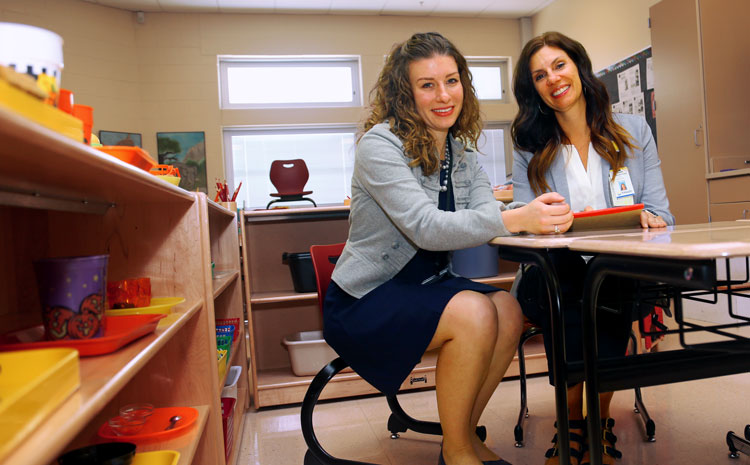
Academic Partnerships: School-Based Care
Nov 7, 2018
By France Griggs Sloat
This fall, Arianna Constantakes, a doctoral candidate in Xavier’s Clinical Psychology (PsyD) program, went back to school—elementary school, that is. Constantakes was placed at North Avondale Montessori in the Cincinnati Public Schools to complete a required traineeship in her quest to become a licensed psychologist.
At North Avondale, she joined a team of professionals with School-based Behavioral Health Services, a program provided by TriHealth. Everyone on her team, including her supervisor, is a graduate of Xavier’s Clinical Psychology doctoral or graduate psychology program and now works for TriHealth.
For about 20 hours a week, she is gaining experience helping young students deal with typical—and not so typical—problems of life at school and at home.
“I hope to work with children and families in the future and was looking for a practicum placement that would allow me to do so,” Constantakes says. “This placement is perfect because I not only have the opportunity to work with children individually and involve their families in the process, but I also am able to experience working in a school setting.”
A unique partnership between Xavier and TriHealth makes her training experience possible. In place since 1997, the school-based program now operates in three of Cincinnati’s public Montessori schools, including North Avondale.
Susan LaVelle Ficke, PsyD, who graduated from Xavier in 2002, was the first practicum student to do her training in the school-based program when it started in 1998. Seven years later, she joined the TriHealth program as a staff psychologist and is now the program coordinator, supervising two to four doctoral trainees each year as well as post-doctoral students who must complete additional training after they graduate.
Funded by the Bethesda Foundation, the program is serving a growing number of young students with a growing array of behavioral problems. But Ficke says the need is greater than their ability to keep up.
“The program has definitely changed in that it’s a more intensive training experience because the population needs have grown in intensity and numbers,” she says. “We are constantly striving to make every dollar count by finding creative ways to impact as many students as we can.”
A major community benefit of the TriHealth-Xavier partnership is that the school-based program allows more students to get care because they can be seen in their schools during the day, which removes many of the barriers people face when trying to access professional care such as cost, work and transportation. About 1,600 students benefited from the school-based program last year.
For graduate students in training like Constantakes, the experience is priceless. Like an apprentice, she learns how to practice her skills on the job, learning from her peers and helping young students at the same time.
“The structure of the TriHealth school-based program is unique in that I am connected with other practicum students and psychologists working in similar places, so I can learn from them and work as a team,” she says.
FEATURE IMAGE: Arianna Constankes, left, helps schoolchildren solve behavioral problems under the supervision of Susan Lavelle Ficke, PhD.